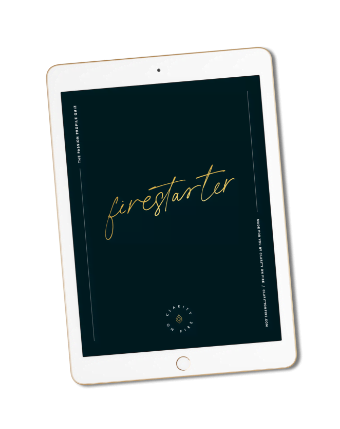{Fun fact: You can highlight any text on this page to create an instant tweet. Try it out!}
Have you ever been in a catch-22-style conundrum when it comes to your money? Maybe you really want to have a different life, but there’s something you need in order to get there (a Master’s degree, a move to a new city, a training certification) … and that thing costs money. Maybe it costs more than you have at your disposal.
So, you get stuck. You can’t move forward, you aren’t moving backward; you’re just … stagnating.
Breaking the cycle isn’t easy. But here’s the good news {or bad, depending on how you choose to look at it}: Not all money problems are physical. Some of them are emotional.
What follows is our “{Tough-)Loving Manifesto about Money & Self-Investment,” which is adapted from the complete Program Guide for our new coaching program, The Passion Plan. It’s a 3-month experience that helps people figure out their passion and make a solid plan to escape their job. If you’re interested in the program and want more info, put your name and email in the blue bar at the top of the page and we’ll send you the entire Program Guide.
[hr style=”1″ /]
A (tough-)loving manifesto about money and self-investment
Money sometimes sucks.
It’s one of the realest, most unavoidable things there is, and it comes with very real paychecks, very real debts, and very real limitations.
It comes with truths like: “I’m tired of living paycheck to paycheck,” and “I really want to take a risk, but the rent isn’t going to pay itself.”
Paying the rent, buying groceries, chipping away at student loans … those are all real-life obligations, and you can’t get around them (well, legally, anyway).
Most people have some combination of both tangible blocks (the real-life obligations) and intangible blocks (the emotional stuff) around money.
The emotional part of money is always on display. It’s in the story most people have learned to tell themselves about money, and you hear it everywhere: “I can’t afford that.” “There never seems to be enough.” “I feel like I don’t really deserve this.”
We don’t question, at all, that some of you have inescapable, real-life blocks when it comes to money.
We will, however, question the story you’ve been telling yourself about money. Because the story and your feelings … they’re emotional, not material. And addressing emotions is what we do for a living.
These are some facts about emotions, and emotional blocks, when it comes to money (and anything else):
- Shutting down and wanting to hide when faced with change is totally normal.
- Normal, however, does not have to mean “necessary.”
- You are worth it, and you are good enough. You don’t earn any badges of honor in life for feeling unworthy or being hard on yourself.
- You can’t get what you want if you don’t take action.
- And what you want usually rises up to greet you as soon as you get off the fence and make a choice (we’ve seen it happen time and time again).
- Procrastination and excuse making is typically your fear trying to sabotage and delay, at all costs, your exit from your comfort zone.
- You’ve probably inherited other people’s (parents, friends, teachers, society at large’s) stories about money, wealth, and having enough … and they might not be true.
- Debt is neither good nor bad; it just matters how having debt makes you feel
- You’ll never feel completely “ready” before making a big change, and convincing yourself to wait until you’re 100% ready is your fear trying (again) to sabotage you.
- Unless you make a change of some kind, you’re going to stay pretty much where you are right now.
We respect your physical blocks. We know, more intimately than we would prefer to, what it’s like to wonder how the rent is going to get paid, or how we could possibly afford something we desperately needed.
But for those of you who have a tingling suspicion that your blocks aren’t solely physical, we ask as fervently and as heartfelt as possible for you to question your emotional blocks. Give them pause. Feel the discomfort, and be curious about its source.
You know yourself best. We’re pretty sure you can tell the difference (even if thinking about it scares you) between what’s really a physical block and what might actually be an emotional block.
We’d hate for you to pass up on something you really want to do, just because you had an emotional block that shut you down and paralyzed you from taking action.
And not to give away the ending, but you should know: Working through emotional blocks always changes your real-life circumstance. To put it bluntly: Typically, people are only broke as long as they have a broke mindset. And through coaching, we permanently shift broke(n) mindsets.
The morals of this story:
A) Make a choice, regardless of what it is. Sitting around, waiting for things to change, and half-heartedly pushing your discomfort to the side and “dealing with it later” aren’t serving you well.
B) Do what you know is right, in your gut (about this, and everything in life). And if you still need some help figuring out what’s right, we’re here to talk.
So, what kind of emotional blocks around money are you holding in to? And what’s it going to take for you to face them? Leave a comment and let us know!
Much love,
Kristen & Rachel



Thank you for this article! I completely identify with “I don’t really deserve this”. As a Mom, I always put family first. Also I feel guilt about leaving my corporate job to start a business (which hasn’t replaced my corporate income yet). So when it comes to spending I always put myself last. My new mantra is: “I am worth it”!!